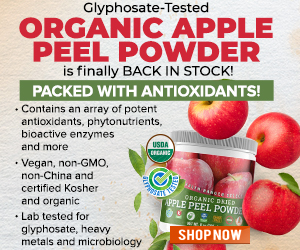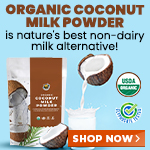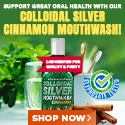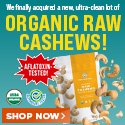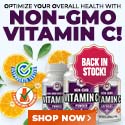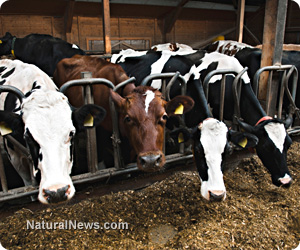
FDA deliberately allows animal drugs to stay legal even when they threaten humans with superbugs
Sunday, March 02, 2014 by: David Gutierrez, staff writer
Tags: animal drugs, superbugs, FDA
- Decades of ignored warnings: How U.S. regulators failed to act on wireless radiation linked to 23 chronic diseases
- The case for holding Norm Eisen accountable: Deep State’s legal mastermind exposed
- China used as SCAPEGOAT for TikTok ban: ISRAEL was the driving force behind the ban, wanted to quash pro-Palestinian content
- California regulators sound alarm: Herbicide paraquat linked to birth defects, thyroid disease and wildlife risks
- Studies strongly suggest taurine supplementation can promote longevity
- DIRTY VACCINES: Dr. Anthony "Fraudulent" Fauci, King of the Covid scamdemic, admits "We don't do placebo trials on vaccines"
- Democrats cry as “liberal supply chains” are wiped out and their favorite multi-billion dollar money machine is shut down
- Hollywood Hills ABLAZE: Wildfires devastate Los Angeles, forcing mass evacuations and claiming lives
- Beef, milk supply TAINTED with new BlackRock-backed animal drug called Bovaer that claims to stop animal farts
- Trump’s reported FBI finalists mark key battle between deep state and loyalist
- The 20 MILLION DEAD PEOPLE collecting social security payments now are same dead ones who VOTED for BIDEN in 2020 that ILLEGALLY won him the swing states
- B’nai Brith Canada introduces “Seven-Point Plan to Combat Antisemitism” that proposes suspension, firing or PRISON TIME for violators
- EPA’s “insurance policy” against Trump is funneling billions to climate organizations: “We’re throwing gold bars off the Titanic”
- DISNEY executive charged with felony child sex abuse … The empire of Disney has always had a child exploitation secret
- This DNC clip shows why Democrats will keep losing...
- UK under leftism becoming wasteland of political prisoners who violated police state’s anti-speech laws
- U.S. pension systems are on the verge of debt collapse
- Britain denies reports that Russia’s “most dangerous” warship held military drills in the English Channel
- Studies strongly suggest taurine supplementation can promote longevity
- Democrats cry as “liberal supply chains” are wiped out and their favorite multi-billion dollar money machine is shut down
- Two containers with completed ballots fall out of truck in Florida
- Stan Johnson on the Health Ranger Report: Henry Gruver’s 2016 vision of second Trump term becomes reality in 2024
- U.S. to sell $300 million upgrade program for South Korean navy’s destroyers
- RFK Jr. clears key hurdle: Sen. Susan Collins backs controversial HHS nominee, signaling a new era for health policy
- UK’s Online Safety Act comes into effect: The dangerous, slippery slope of censorship laws
- EPA advisor admits the agency is funneling billions to climate groups ahead of Trump’s return to White House
- Ukraine’s brutal assassination of Russian General Kirillov reveals the depths of coverup for biological weapons and bio labs in Ukraine
- PBS shutters DEI office in wake of Trump’s executive order
- This DNC clip shows why Democrats will keep losing...
- “Cancer Gag Act” threatens farmers’ rights and public health: A dangerous push for corporate immunity
- Top 10 foods that BOOST DOPAMINE and help you stay focused, fit, positive and motivated
- Mike Adams and Dane Wigington expose the truth: Are homes being intentionally ignited in California?
- Mach 7 drone illustrates China's latest leap in hypersonic technology
- DISNEY executive charged with felony child sex abuse … The empire of Disney has always had a child exploitation secret
- Britain denies reports that Russia’s “most dangerous” warship held military drills in the English Channel
- Trump’s reported FBI finalists mark key battle between deep state and loyalist
- EPA advisor admits the agency is funneling billions to climate groups ahead of Trump’s return to White House
- Global leaders unite to clamp down on “misinformation” with UN-backed Cascais Declaration
- HYSSOP: What research reveals about the health benefits of this ancient holy herb
- I Want My Bailout Money – new song released by Mike Adams
- Global tensions, natural disasters and the looming shadow of world war - all predicted by Mike Adams and Steve Quayle three years ago
- The new American dream: $500,000 nuclear bunkers and the fear of WWIII
- Trump is taking on the media, exposing defamation and WINNING BIG
- Big Banks shift the burden of losses to taxpayers through the Federal Reserve in the form of BAILOUTS
- Is America's "giant debt factory" Federal Reserve setting us up for an economic nightmare?
- Top 10 foods that BOOST DOPAMINE and help you stay focused, fit, positive and motivated
- State Farm cancels thousands of home insurance policies in the Pacific Palisades region months before deadly fires
- Biden announces additional $500M military aid for Ukraine as California wildfires displace 70,000 residents
- Chemotherapy found to increase the number of tumor cells circulating in the blood, spreading it to previously unaffected areas
- Experts warn: Centralized digital currencies could be used to control how people behave
- Russia signals willingness to negotiate peace deal with Ukraine at neutral site in SLOVAKIA, but Ukraine rejects it
- Stan Johnson on the Health Ranger Report: Henry Gruver’s 2016 vision of second Trump term becomes reality in 2024
- Mike Adams Sermon 42: God’s superfruit FIGS can fight warts, staph infections and cancer
- New BRICS banking system will render Western sanctions on Russia USELESS
- Red Cross issues warning to stop blood plasma donations from vaccinated people
- Scientists confirm: GENIUS brain function can be spontaneously unleashed in humans without any apparent cause
- DATA: England’s vaccinated population had close to one million deaths in 23 months; unvaccinated population had less than 61,000 deaths over the same period
- HYSSOP: What research reveals about the health benefits of this ancient holy herb
- Arizona residents drive entire Maricopa County Board of Supervisors out of meeting after serving them for TREASON
- Fully vaccinated about to see “tsunami” of illness and death, warns virologist
- Today I asked our AI language model “Neo” about which phytonutrients or phytochemicals can block the spike protein related to SARS-CoV-2 … Here is what it answered…
- Two containers with completed ballots fall out of truck in Florida
- BREAKING: 2025 NDAA authorizes mandatory military draft of WOMEN across America… as Pentagon pursues global NUCLEAR war with both Russia and China at the same time
- We are building the infrastructure of human freedom… Brighteon.AI is the next launch that will put life-altering LLM technology into your hands for free
- Michael Yon warns of a ZIONIST TAKEOVER in Trump’s second administration
- ENGINEERED FAMINE: Oregon starts SHUTTING DOWN small farms “to protect the people”
- NASA admits that climate change occurs because of changes in Earth’s solar orbit, and NOT because of SUVs and fossil fuels
- Ozempic and Wegovy weight loss drugs are injectable LIZARD VENOM PEPTIDES that may unleash a devastating wave of organ failure… side effects align with symptoms of SNAKE BITES
- These 13 countries just signed an agreement to engineer a global FAMINE by destroying food supply
- Careless Whisper: AI-powered transcription tool being used by hospitals found to invent chunks of text no one ever said
- BBC staffers accuse media outlet’s executives of instituting bias in Gaza coverage, claiming favorable treatment of Israel
- Casual restaurant chain TGI Fridays files for BANKRUPTCY
Microbiologist and lead author Carmen Cordova called the FDA's inaction in the face of its own findings "a breach of their responsibility and the public trust."
The study is the latest contribution to an ongoing debate over the prolific use of antibiotics as growth-promoting agents in the meat industry. Scientists and health professionals have been warning for years that this practice promotes the evolution of antibiotic resistance in bacteria, including among many species that can infect human beings.
Antibiotic-resistant infections are responsible for 23,000 deaths per year in the United States alone.
No evidence of safety
In order to evaluate the agency's regulation of antibiotics in agriculture, the NRDC reviewed more than 3,000 pages of internal FDA documents acquired as the result of a Freedom of Information Act request. The documents focused on 30 penicillin- and tetracycline-based drugs that the FDA had approved for use as feed additives. All 30 drugs were approved for "subtherapeutic" or "nontherapeutic" uses, meaning that they could be used for goals such as growth promotion even in the absence of a bacterial infection.In a review conducted between 2001 and 2010, the FDA classified 18 of the antibiotics as posing a "high risk" of contributing to health problems in humans. The other 12 were not classified as safe, but escaped being labeled "high risk" simply because there was not enough data to make any definitive statements about their safety at all.
The NRDC says that 26 of the drugs studied had actually been approved by the FDA even though their manufacturers had never met the requirement (under a 1973 FDA policy) of submitting scientific studies proving their safety.
In spite of these findings, the FDA took no action to remove a single one of the 30 drugs from the market, the NRDC report says. Although some of the drugs have since been pulled from the market by their manufacturers, nine of the drugs classified as "high risk" are still being regularly used.
"Pattern of delay and inaction"
Just last year, the FDA announced new voluntary guidelines intended to lead to a phasing out of antibiotics as growth enhancers in livestock.According to Deputy FDA Commissioner Michael Taylor, once a company has voluntarily removed farm-production uses from a drug's label, it becomes illegal to use that drug for such goals. Taylor said that the FDA will take action against agribusinesses that violate the new usage rules.
But NRDC attorney and study co-author Avinash Kar questioned whether the FDA can be trusted to enforce these rules.
A case in point is the drug Penicillin G Procaine 50/100, which Zoetis Inc. makes as a poultry growth promoter. The NRDC says that it has contacted the FDA on two separate occasions to draw attention to the fact that the drug was approved without meeting the FDA's own safety guidelines. Yet the drug is still on the market, although the company (a Pfizer subsidiary) says it has plans to phase it out as a growth promoter.
"The FDA's failure to act on its own findings about the 30 reviewed antibiotic feed additives is part of a larger pattern of delay and inaction in tackling livestock drug use that goes back four decades," Kar said.
"They are not meeting their responsibility to protect public health. They need to be doing better."
Sources for this article include:
www.reuters.com
http://www.washingtonpost.com
http://science.naturalnews.com
Animal drugs at FETCH.news
Get independent news alerts on natural cures, food lab tests, cannabis medicine, science, robotics, drones, privacy and more.
Take Action: Support Natural News by linking to this article from your website
Permalink to this article:
Embed article link: (copy HTML code below):
Reprinting this article:
Non-commercial use OK, cite NaturalNews.com with clickable link.
Follow Natural News on Facebook, Twitter, Google Plus, and Pinterest
Science News & Studies
Medicine News and Information
Food News & Studies
Health News & Studies
Herbs News & Information
Pollution News & Studies
Cancer News & Studies
Climate News & Studies
Survival News & Information
Gear News & Information
News covering technology, stocks, hackers, and more



"Big Tech and mainstream media are constantly trying to silence the independent voices that dare to bring you the truth about toxic food ingredients, dangerous medications and the failed, fraudulent science of the profit-driven medical establishment.
Email is one of the best ways to make sure you stay informed, without the censorship of the tech giants (Google, Apple, Facebook, Twitter, YouTube, etc.). Stay informed and you'll even likely learn information that may help save your own life."
–The Health Ranger, Mike Adams











